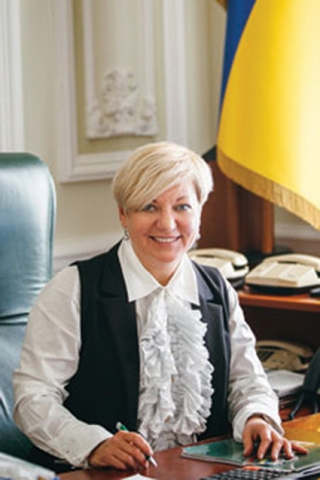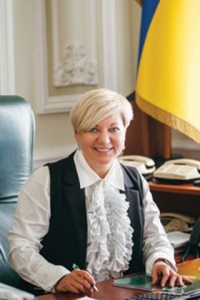Ukraine Reformist Central Banker Steadfast Under Political Pressure
At midnight on October 31, an online database made public the incomes and assets of Ukrainian political officials. The so-called declaration system was meant to provide transparency and discourage corruption. Instead, Ukrainians became painfully aware how wealthy their government officials had become. Ukrainians, who earn a mere USD 200 a month, began to question the value of the anti-corruption campaign.
Ukraine is deeply divided. On one side is an entrenched, moneyed elite that has steadfastly resisted reform. On the other side is a new coalition of young technocrats that wants to modernize the economy and get rid of corruption. Valeriya Gontareva, governor of the National Bank of the Ukraine, has emerged as a leader for the latter group and has come under fierce attack as a consequence.
Prior to the Euromaidan revolution in 2014, the administration of former president Viktor Yanukovych allowed banks and bank owners to operate virtually without restrictions. Corruption was endemic. Many bank owners treated the institutions they oversaw as their personal pocketbooks. They routinely gave themselves extravagant loans with no intention of repaying them. Some even used the loans to buy more banks and increase their spheres of influence.
Gontareva began dismantling these banks soon after taking the helm at NBU in June 2014, eventually closing nearly half of Ukraine’s 180 banks. In accordance with the law, she has transferred assets from shuttered banks to the Deposit Guarantee Fund, Ukraine’s equivalent of the FDIC, which reimbursed depositors for some of their pyramid-like scheme losses.
As a result, many of Ukraine’s richest business executives were enraged by the loss of their banks and their access to easy cash. They include some of Ukraine’s most prominent oligarchs, such as Dmytro Firtash (Nadra Bank), Kostyantyn Zhyvago (Finance and Credit Bank) and Oleh Bakhmatiuk (Financial Initiative Bank, VAB Bank). These well-connected businessmen used their bank franchises as cash cows to generate revenues for party-related businesses and to fund their extravagant lifestyles.
The National Bank of Ukraine’s decision to use a flexible exchange rate rather than a fixed rate exacerbated tensions with the nation’s elite, who saw the value of their holdings plummet. The National Bank had no choice but to devaluate in the face of a huge budget deficit. But the swift depreciation of the hryvnia led to a sharp rise in Ukraine’s annualized inflation to a whopping 61 percent in April 2015. Fortunately for Ukraine, Gontareva’s hardball monetary policy brought inflation down to 8 percent within a year.
Gontareva’s determination to fight corruption and enforce a modernized monetary policy left her with few friends in the halls of power. The National Bank was dogged by demonstrations backed by failing bank owners. During meetings of the International Monetary Fund and the World Bank in Washington, D.C., earlier this year, Ukrainian steel businessman and independent parliamentarian Serhiy Taruta distributed a thirty-two-page pamphlet titled Gontareva: A Threat to the Economic Security of Ukraine.
The pamphlet, poorly translated into English, called for Gontareva’s ouster. It describes her as “the most destructive force in the Ukrainian economy” even though most major economic indicators suggest the opposite. The pamphlet spurred action in the Ukranian capital of Kyiv. Just days after the IMF and World Bank meetings, Ukrainian parliamentarians introduced a draft law calling for major changes in the National Bank of Ukraine including stripping away its independence and dismissing Gontareva.
In Parliament Gontareva’s opponents are led by Oleh Lyashko and Viktor Galasiuk, the chairman and deputy chairman respectively of the Radical Party and sponsors of the draft law. In his public declaration of assets, Lyashko listed only a single pitchfork.
Batkivschyna Party leader Yuliya Tymoshenko has also thrown her weight behind Gontareva’s detractors, spurred from the shadows by billionaire oligarch Igor Kolomoysky and the Privat Clan. Kolomoysky runs Ukraine’s largest bank and has been aggressively defending it against Gontareva’s reform attempts.
While Lyashko and his allies say the legislation is popular, it is in fact a thinly veiled attempt to weaken the central bank and strengthen the hand of the kleptocratic elites.
Gontareva enjoys wide support internationally and also at home among some key constituencies. Sixteen of Ukraine’s largest commercial banks, including reputable international ones like Raiffeisen, Banca Intesa and BNP Paribas, signed a letter in support of the independence of the National Bank of Ukraine and its Governor. The IMF, the European Union, the European Bank for Reconstruction and Development, the World Bank and ambassadors of the G7 Group have also offered their support for Gontareva’s reform policies and criticized attempts to weaken the role of the banking regulator.
Ukraine needs reform. Aid from the International Monetary Fund, for example, is dependent on the independence of the central bank. What’s more, any move to limit the central bank’s independence would almost certainly end financial assistance from the West and jeopardize Ukraine’s relations with its creditors.
Gontareva’s leadership opens a new chapter in Ukraine economic progress and anti-corruption fight. Her drive for transparency and modernization deserves wide support.
Eugen Iladi












